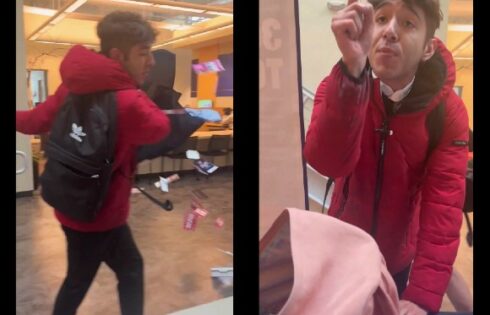
Unsatisfied? Send us comments proposing definitions
The Department of Education’s proposed draft regulations for reinterpreting Title IX include several sections with undefined phrases. From university officials to lawyers and activists, interested parties would probably like to know how the government interprets these terms.
That’s why they should suggest definitions for terms in the draft, a department official familiar with the rulemaking told The College Fix last week.
Leaked to The New York Times in August but posted publicly earlier this month, the Aug. 25 interagency draft has drawn concern from supporters of due process in campus sexual-misconduct proceedings for potential unintended consequences.
One of those is encouraging universities to drop live hearings where panelists evaluate evidence and render judgment, in favor of “single investigator” proceedings where one official acts as prosecutor, judge and jury.
The department is intent on requiring colleges to provide a meaningful opportunity for parties to question each other, regardless of the format of the proceeding, the official sought to assure The Fix in a phone interview. The official also said there’s no more recent draft circulating, to their knowledge.
Can it fix ‘the systemic biases’ in campus proceedings?
The draft emphasizes that the department is proposing the first binding regulations since its 1975 regulations.
Previous administrations used a “series of guidance documents” that left all parties, from universities to advocates for “survivors” and accused students, in a position of “uncertainty about whether the guidance was or was not legally binding,” the draft alleged.
It cited Trump administration meetings with stakeholders and scholarship including the 2017 law review article “The Sex Bureaucracy” by two Harvard Law School professors.
The draft cites numerous criticisms of prior guidance, including the 60-day deadline for completing campus investigations, “compulsory use” of one evidence standard, misconduct definitions that infringed on academic freedom, and restrictions on “reasonable options” for how each school should structure its own processes. (The Trump administration left in place the Bush administration’s 2001 guidance because it was subject to “public notice and comment,” it clarifies.)
MORE: Department of Ed draft says bias against accused students violates Title IX
Major media reports on the leaked draft have emphasized where it would seriously depart from prior administration practice, particularly in defining sexual harassment by Supreme Court precedent and clarifying that discrimination against accused students can violate Title IX.
Other writers have focused on where the draft takes a conservative approach to modifying university practices, or leaves allegedly problematic areas untouched.
Robby Soave at Reason called the changes “sensible but rather mild” overall, and expressed doubt that new regulations could overcome “the systemic biases of a bureaucratic system under constant pressure to always and automatically believe the victim.”
An idea for a method that ‘effectively substitutes’ for cross-examination
The draft’s confirmation that universities don’t have to offer live hearings – even though they must offer a method that “effectively substitutes” for cross-examination in non-hearing proceedings – has puzzled some lawyers and academics.
Brooklyn College Prof. KC Johnson, co-author of The Campus Rape Frenzy, has expressed doubt that this effective-substitute threshold could be met under a single-investigator model.
“The regulations do not appear to explain how the single-investigator process, which is explicitly designed to eliminate cross-examination, could replicate the benefits of cross-examination,” Johnson wrote.
The draft indeed does not explain this. All it says is that for colleges using a “non-hearing model,” each party must be allowed to submit written questions for the investigator to ask “the other party and witnesses in a manner that effectively substitutes for cross-examination.”
Even in hearings, the draft allows colleges to restrict participation by the parties’ advisors, such as attorneys, “as long as the restrictions apply equally to both parties.”
Not only do these rules let schools “funnel questions for the accuser and other witnesses” through the hearing panel, “which won’t be required to ask them,” Johnson wrote, but the cross-examination mandate in hearings “will likely generate strong pressure” to abandon hearings in sexual-misconduct cases entirely.
“Resisting this pressure [‘from accusers’ rights organizations and their political and media allies’] will require a degree of courage largely absent from university presidents during the debate over campus due process,” he wrote.
The law firm Zalkind Duncan & Bernstein zeroed in on how these changes to hearings versus non-hearings could affect proceedings.
In a Friday blog post, partner Ruth O’Meara-Costello acknowledged that the draft bans colleges from simply refusing to ask each party’s questions to the other with no explanation. They have to explain to the asking party why each nixed question is “not relevant.”
“Unfortunately, it seems very likely that colleges and universities, many of which have taken strong positions against allowing cross-examination, will respond to the rules by simply eschewing actual hearings in favor of the increasingly popular single-investigator model,” O’Meara-Costello wrote.
In her experience, hearing panels “are often better able to focus on credibility and truth-finding,” particularly when they include students and faculty. Investigators, on the other hand, may care more about “protecting the institution” than getting the facts correct, she wrote.
“[R]espondents may lose more than they gain” from the cross-examination mandate in hearings if colleges simply drop the hearing model in response, O’Meara-Costello said.
MORE: Anti-rape activists ‘wildly off-base’ with criticism of draft
The department didn’t specify a particular method that “effectively substitutes” for cross-examination in the investigator model because it expects “robust public comment” to suggest a variety of methods, the official told The Fix.
Whatever method is imposed should be as close to a real-time format as possible, perhaps through simultaneous videoconferencing with both parties, the official said.
The draft’s allowance of the single-investigator model is in keeping with the department’s aversion to imposing the same highly prescriptive rules on the wide variety of colleges in the U.S., the official said.
It’s determined to take only those positions mandated in the text of Title IX or Supreme Court precedent, the official said.
Some commenters have noted that the department’s draft is out of step with the past year’s precedent from the 6th U.S. Circuit Court of Appeals. Its most recent decision in a campus due-process case, against the University of Michigan, not only requires colleges to allow cross-examination in sexual-misconduct cases that turn on credibility, but appears to preclude them from using the single-investigator model.
The official declined to comment even on background about the merits of hearings versus single-investigator models, but said colleges may not be as averse to the participation of lawyers as some commenters think.
The department is staying within the limits of the Clery Act, which governs campus crime reporting, by letting colleges restrict the participation of advisors on an equal basis, the official said. But if they do choose to use hearings, they may prefer to have lawyers conduct the cross-examination so the parties don’t interact with each other directly.
Aug. 25, 2018 draft proposed regulations for reinterpreting Title IX by The College Fix on Scribd
‘Blanket’ confidentiality agreements are banned
Several others sections of the draft may have observers scratching their heads as well.
The draft requires colleges to give accused students “sufficient time to prepare a response” after being given notice of the allegations against them, before they are interviewed.
While the “sufficient details” required in the notice are spelled out explicitly – including identities of parties, the specific section of the college’s policy, the conduct that violates this policy and “date and location” of the incident if known – the “sufficient time” is not.
The official told The Fix that “sufficient time” is enough for accused students to line up an advisor and digest the detailed allegations in the notice.
The draft also requires colleges to create an investigative report for the parties to review that “fairly summarizes relevant evidence,” and let them respond to it before determining guilt.
Though the department anticipates comments asking for more specificity on what is “fair” and “relevant,” the official stressed that the draft already requires colleges to disclose all evidence to parties, even when it’s not used in a determination. The written notice given to parties when a formal complaint is filed must inform them of their right to see evidence, and it must be given to them “promptly” when requested.
One section of the draft appears to ban colleges from imposing gag orders on accused students, which can not only isolate them from support mechanisms but also cripple their defense.
Colleges are not allowed to “restrict the ability of either party to discuss the allegations under investigation or to gather and present relevant evidence,” the draft reads. The official said this should be construed as a ban on “blanket” confidentiality agreements, rather than specific, narrow restrictions.
Some of the draft’s provisions are intended to clarify that colleges retain leeway to run proceedings their own way.
In a section titled “Retaliation,” the draft says “nothing herein restricts” colleges from taking disciplinary action against a student or employee who “intentionally submits a formal complaint in bad faith” or “knowingly provides false information” in a proceeding.
The department isn’t mandating that colleges punish students who abuse proceedings because Title IX doesn’t mention discipline, the official said.
Silent on ‘supportive measures’ for accused students
On several other parts of the draft, the official declined to talk even on background with The Fix.
The draft defines “supportive measures” as “non-disciplinary individualized services” offered to the parties in a proceeding, but it only explicitly requires colleges to grant supportive measures to “complainants” (accusers). Any supportive measures offered to “respondents” (accused students) appear to be at the discretion of colleges.
It doesn’t explain why colleges “may” dismiss a formal complaint if the college determines the allegation wouldn’t constitute sexual harassment, as opposed to “must.”
In its determination to require colleges to treat parties equally, the draft also fails to recognize that colleges effectively act as prosecutors against accused students. Any equal restrictions imposed on the parties, such as advisor participation, are still functionally tilted against accused students.
One section of the draft shows that the department is weighing at least two options for when to allow colleges to use the preponderance standard of evidence, casually known as “more likely than not.”
This standard was required in Obama administration guidance, but the Trump administration’s interim guidance has allowed colleges to use either preponderance or “clear and convincing,” an evidence standard that roughly translates to 75 percent certainty.
The draft includes bracketed suggestions in this section: Colleges can use preponderance only if it’s also their evidence standard “for all other discriminatory harassment complaints,” or if it uses that standard “for other cases of comparable seriousness.”
This section gives no indication what “comparable seriousness” might mean. If a college wanted to preserve its use of the preponderance standard for sexual misconduct cases, under the “comparable seriousness” standard, it could simply deem sexual misconduct uniquely serious.
MORE: 6th Circuit says ‘My Cousin Vinny’ justifies cross-examination in Title IX
IMAGE: pathdoc/Shutterstock
Like The College Fix on Facebook / Follow us on Twitter






Please join the conversation about our stories on Facebook, Twitter, Instagram, Reddit, MeWe, Rumble, Gab, Minds and Gettr.